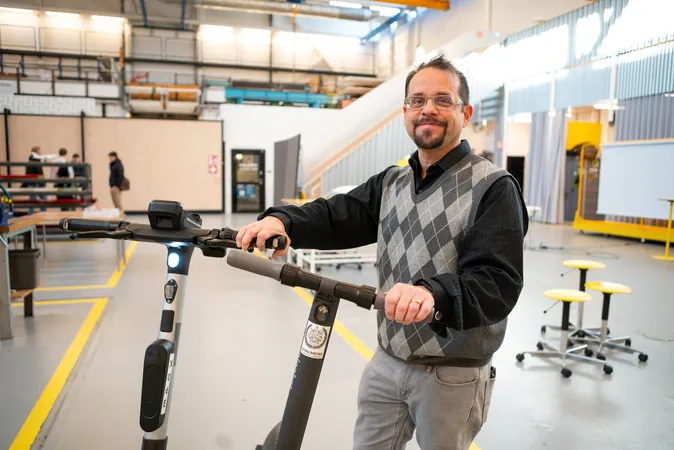
Shocking Study Reveals Reckless Riding as the Primary Cause of E-Scooter Crashes!
2025-03-25
Author: Jia
A groundbreaking study from Chalmers University of Technology in Sweden has unveiled alarming statistics about electric scooter accidents, attributing the majority of crashes to reckless rider behavior. Through extensive research focused on urban environments, the data highlights dangerous habits such as one-handed steering and group riding as significant risk factors.
The study, titled "Understanding factors influencing e-scooterist crash risk: A naturalistic study of rental e-scooters in an urban area," published in the journal Accident Analysis & Prevention, marks an important step in understanding the causes of e-scooter incidents. It captures the complex relationship between urban mobility and rider conduct as e-scooters become increasingly popular for short trips and leisurely rides alike.
According to Professor Marco Dozza, a leading figure in the study, many riders perceive e-scooters both as a convenience for quick travel and as a source of recreation. Unfortunately, this recreational aspect can encourage hazardous behaviors, significantly elevating the risk of crashes. "While most riders act responsibly, our analysis shows that a small percentage engage in reckless acts, generating safety risks not typically seen with other vehicles," he stated.
Researchers analyzed data gathered from nearly 7,000 rides involving rented e-scooters, identifying 61 critical safety incidents, including 19 crashes and 42 near-misses. A shocking 20% of these incidents involved riders intentionally creating dangerous situations, suggesting a worrying trend that is more prevalent among e-scooter users than in other forms of transportation.
Professor Dozza emphasizes that the lack of established norms for e-scooter use may contribute to this reckless behavior. "Since many scooters are rentals, riders may feel less accountable for their actions, leading to a disregard for safety," he noted.
The study revealed several surprising findings: riding with one hand increases crash likelihood by six times, while riding together in groups or texting while driving nearly triples the risk of accidents. Dozza elaborates, "Unlike bicycles, steering and braking on electric scooters require more attention and both hands, making distractions particularly dangerous."
Experience also plays a crucial role in safety; the study found that new riders face the highest risk of accidents, particularly during their initial rides. Interestingly, the purpose of the trip influences the likelihood of crashes; commuting tends to be safer compared to more casual or erratic riding behaviors.
Moreover, the research uncovered that nearly 30% of critical events involved cars, raising concerns about how cyclists navigate urban infrastructure. Many accidents occur at intersections, where visibility can become problematic. "Our findings suggest that motorists might struggle to see e-scooter riders, especially when bike lanes are unavailable, which could lead to tragic outcomes," Dozza expressed.
To combat these dangers, researchers propose advanced technological solutions that could potentially enhance the safety of e-scooter use. Innovations, such as collision warnings and reminders to keep both hands on the handlebars, could be integrated into e-scooter systems. This tech could help monitor rider behavior, reducing risky riding practices and adjusting speeds in high-risk areas through geofencing technology.
However, Professor Dozza believes that shifting rider behaviors through education and training is the most effective way to improve safety. "Just as we teach children to ride bikes, we should provide practical training for e-scooter users. Education might be essential before they are allowed to rent these vehicles," he suggested.
As cities continue to embrace electric scooters, this pivotal research highlights the urgent need for enhanced safety measures. The combination of technology and behavioral changes could pave the way for a safer future where e-scooters complement urban mobility rather than compromise it.
With e-scooter rentals on the rise, will cities take action before more accidents occur? The clock is ticking—let's prioritize safety before the next ride becomes a dangerous gamble!




 Brasil (PT)
Brasil (PT)
 Canada (EN)
Canada (EN)
 Chile (ES)
Chile (ES)
 Česko (CS)
Česko (CS)
 대한민국 (KO)
대한민국 (KO)
 España (ES)
España (ES)
 France (FR)
France (FR)
 Hong Kong (EN)
Hong Kong (EN)
 Italia (IT)
Italia (IT)
 日本 (JA)
日本 (JA)
 Magyarország (HU)
Magyarország (HU)
 Norge (NO)
Norge (NO)
 Polska (PL)
Polska (PL)
 Schweiz (DE)
Schweiz (DE)
 Singapore (EN)
Singapore (EN)
 Sverige (SV)
Sverige (SV)
 Suomi (FI)
Suomi (FI)
 Türkiye (TR)
Türkiye (TR)
 الإمارات العربية المتحدة (AR)
الإمارات العربية المتحدة (AR)